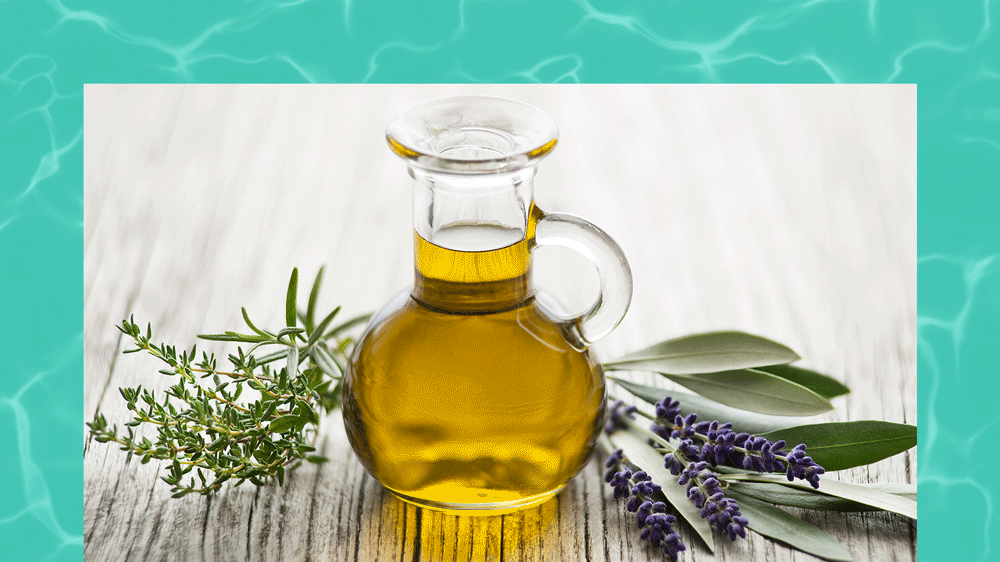Olive Oil Is a Trending Skincare Ingredient, But Is It Actually Good for Your Skin?

Getty Images/InStyle
Thanks to J.Lo, olive oil is having a moment.
While a drizzle of the pantry staple adds flavor to any salad or pasta, the star has chosen it as the hero ingredient of her eponymous skincare line.
Using olive oil on the skin isn't a revolutionary concept. Beauty brands have been incorporating it into their skincare product formulas for years, and a quick Google search will give you a ton of DIY skincare hacks on how to use olive oil as a cleanser or moisturizer.
But before you invest in olive oil-infused skincare or use some straight from the bottle on your face, we turned to two top dermatologists to break down the benefits of using the oil in your skincare routine, plus the possible side effects.
RELATED: How Exactly Does Turmeric Benefit the Skin?
What Are the Skincare Benefits of Olive Oil?
Olive oil has been used in skincare for centuries, because it has antioxidant and anti-inflammatory properties, but its negatives might outweigh the benefits. It turns out the oil's emollient properties aren't the best option for hydrating the skin.
"Olive oil has a high percentage of the fatty acids oleic acid and linoleic acid, the latter of which is an essential fatty acid for the skin," says Caroline Robinson, MD, FAAD, dermatologist and founder of Tone Dermatology. "Essential fatty acids are those that our skin cannot make on its own but most people are able to get enough of these through diet."
However, the dermatologist says oleic acid (not an essential fatty acid) has kinks within its chain, allowing for water to escape, potentially increasing the risk of further dehydration. It can also be pore-clogging for acne-prone skin (more on that later).
What Are the Potential Side Effects of Olive Oil?
"Small studies show that [olive oil] may disrupt the skin barrier, so while it may not be harmful for most people, for those with sensitive skin or acne, it would not be a good choice and there are far better ingredients including glycerin, hyaluronic acid, ceramides, and dimethicone that are more beneficial for skin hydration and maintaining a healthy skin barrier," explains Shari Marchbein, MD, FAAD, a dermatologist in New York City.
And since olive oil is moderately comedogenic, it can clog pores and trigger breakouts in acne-prone or oily skin types.
On top of clogging pores and furthering dryness, olive oil may also cause flaking or dandruff in susceptible skin types. "It could cause a flare of malassezia, the yeast organism which causes dandruff, which feeds on olive oil," Dr. Marchbein says. "Oleic acid (the main fatty acid in olive oil) is created when the yeast that causes dandruff breaks down sebum on the skin."
That being said, if you were to incorporate olive oil into your routine, it's likely to not disagree with other active skincare ingredients, but Dr. Robinson says because of its composition and unique interaction with the skin, it can be complicated to know for sure.
VIDEO: When You Apply Sunscreen in Your Skincare Routine Actually Matters A Lot
So, Is Olive Oil Safe for the Skin?
Both dermatologists agree that more studies need to be done on the effects of olive oil, but in the meantime, there are better hydrating ingredients to incorporate into your skincare routine.
"Certain oils act as emollients to smooth and soften the skin, jojoba oil and mineral oil are examples," says Dr. Marchbein. "Although face oil would not be my first choice products as either a cleanser or moisturizer, for those with dry, sensitive skin, it may be tolerated." Instead, she recommends a moisturizer that combines emollients, humectants, and occlusives including hyaluronic acid, glycerin, and dimethicone.
But before you toss any skincare products with olive oil on their ingredients lists, products formulated with it typically contain small amounts, and are less likely to cause side effects. However, if you're making DIY masks or using olive oil as the first step in a double cleanse, it's better to be safe than sorry.
"I advise my patients to avoid the tempting DIY masks and skincare recipes online," says Dr. Robinson. "While these are generally safe, they are not the most effective, and put the skin at risk of breakouts and dehydration."
From non-toxic makeup and skincare to sustainability practices, Clean Slate is an exploration of all things in the green beauty space.

